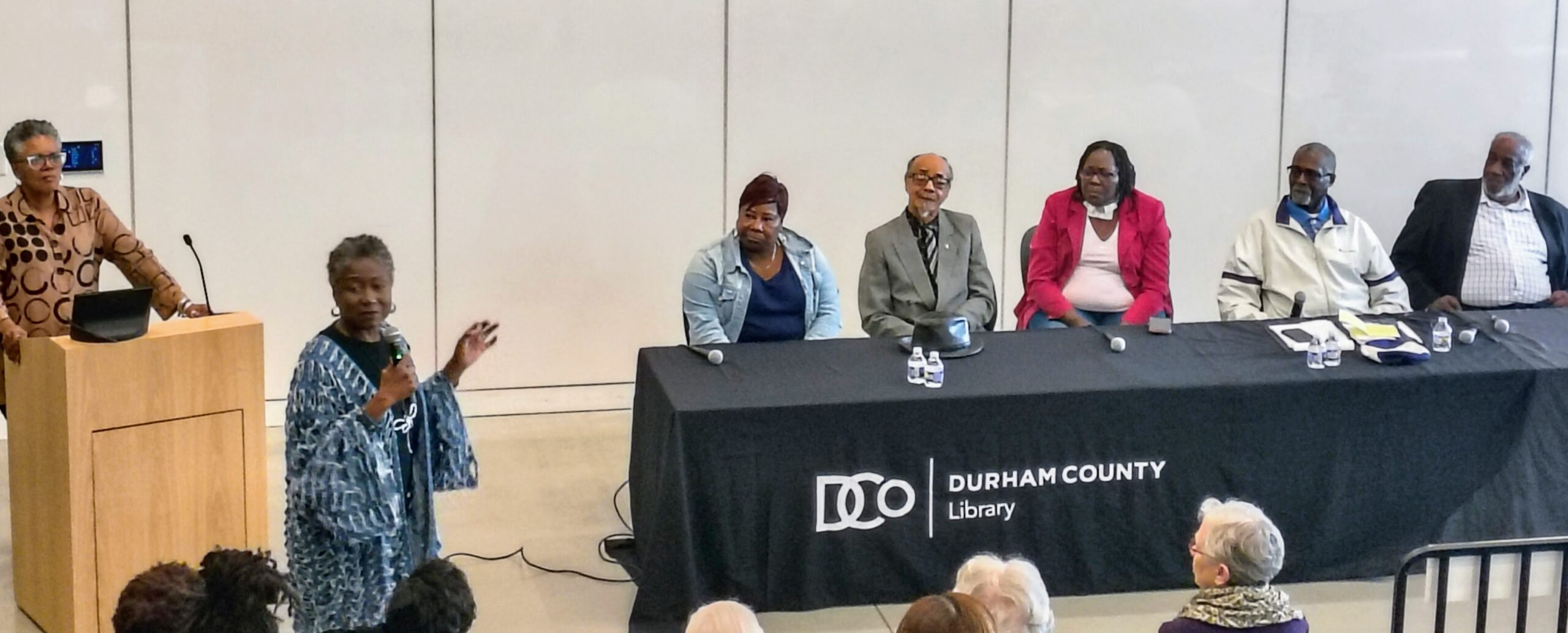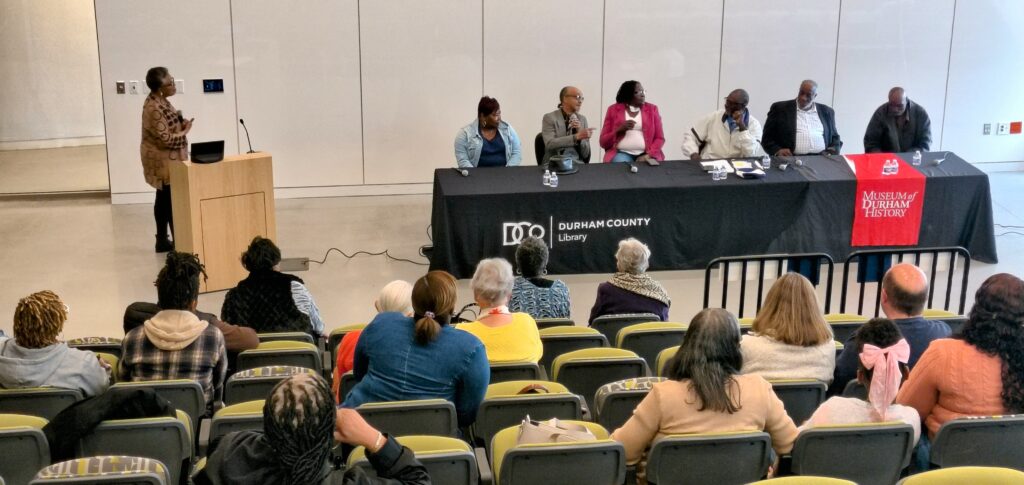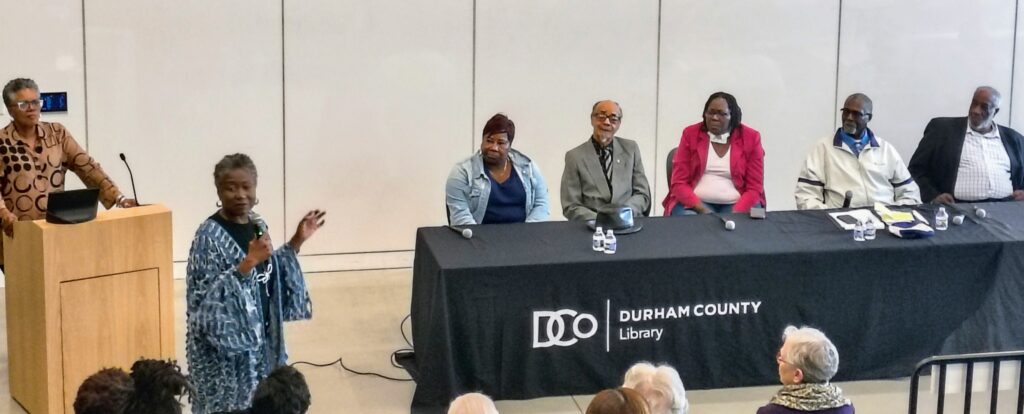Joyce Nichols Panel Discussion Caps “100 Years of Duke: Names to Remember”
Posted on May 2, 2025
A Library Fest 2025 Recap by the Museum of Durham History
On Saturday, April 12, the Museum of Durham History, Durham County Library, and Durham Library Foundation welcomed community members for an unforgettable panel discussion honoring the life and legacy of Joyce Clayton Thorpe Nichols—known lovingly to many as “Aunt Joyce” or “Mama.”
Held at the Durham County Main Library as part of Library Fest 2025: North Carolina Edition, this fireside chat was more than just a tribute. It was a living reminder of the power of everyday people to change the course of a community. As moderator Mayme Webb-Bledsoe (pictured above at lectern), Duke University’s Assistant Vice President for Community Development and Chair of the Durham Housing Authority so poignantly said:
“We’re talking about regular people trying to do good things in Durham.”
Born in 1940, Nichols became the first female Physician Assistant (PA) in the United States, a trailblazer in the 1960s fair housing movement, and a fierce healthcare advocate who helped found both rural and urban clinics across Durham County. But to her family and to so many who knew her, she was also the one who showed up, stayed strong, and kept going—even when the odds were stacked high.
A Legacy of Strength and Support
Nichols’ children, grandchildren, and extended family gathered to share stories that painted a vivid portrait of a woman who demanded the best from others and gave even more of herself.
Her son Will Thorpe (pictured below in white coat) remembered her drive, discipline, and fierce love:
“She would say, ‘Be the best at whatever you do.’”
“She was like the tortoise in the race. She might go slow and steady—but in the end, she was there.”
His sister, Symetta Williams (pictured below in pink blazer), reflected on how her mother and their aunt instilled values that still guide the family:
“Everybody shows up for everybody. Those were the values she and our auntie instilled in us, passed on from generation to generation.”
Joyce Nichols raised her children to be active, competitive, and curious. She made sure they understood the value of hard work and kindness.
“Show no meanness,” Will recalled. “She valued friends the most.”

Joyce Nichols’ journey wasn’t easy. She applied to Duke’s PA program more than once before finally getting accepted in 1968. But she had determination.
“She struggled with getting her education,” her daughter said. “Mama had a saying: ‘I’m like a ball—the harder you hit me, the higher I bounce.’ She did better when under pressure.”
She raised children while pursuing her medical training, a fact noted by audience member Musu Clemens (pictured below holding microphone), whose mother went through the PA program a year after Nichols.
“Don’t gloss over that,” Clemens said. “That was hard.”
Durham native Angela Lewis, in town for an HBCU event about PAs, brought a student with her to witness the panel:
“She paved the way for me to be a PA.”

Fighting for Justice, With and Without a Doctor Bag
The stories shared reminded us that Joyce Nichols’ advocacy started long before she wore a white coat. In 1965, she took a stand against the Durham Housing Authority after they tried to evict her from McDougald Terrace.
“My grandfather kept the kids with him for a few days,” Will said. “The housing authority thought he was living there. She fought that.”
Her lawyers—including Mickey Michaux—helped Nichols change public housing law: tenants could no longer be evicted without a hearing.
Later, as a practicing PA, Nichols made house calls with her doctor bag. She helped her nephew Chuck, a drag racer who had survived both a racing accident and childhood polio, learn to walk again. She founded Durham’s first foot care clinic and coordinated health care for people experiencing homelessness.
“She would say, ‘You have to first help yourself—then God will help you.’”
“I can show you better than I can tell you.”
“It’s not where you came from—it’s where you’re going.”
The Heart of the Community
In between the heavier moments were stories of warmth: her legendary peach cobbler and yeast rolls, her uncompromising approach to honesty, and her loyalty to those she loved.
When Webb-Bledsoe asked the panel what they would say to someone growing up in public housing today, the answer was clear:
“Find you a Joyce Nichols.”
We are so thankful to the Nichols family for sharing their memories, to Mayme Webb-Bledsoe for guiding such a powerful conversation, and to our Library Fest partners and exhibit sponsors, including Duke Community Affairs, First Horizon Foundation, The Forest at Duke, Fox Family Foundation, and Mary Duke Biddle Foundation, for making this event possible.




